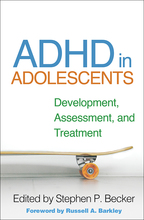ADHD in Adolescents
Development, Assessment, and Treatment
Edited by Stephen P. Becker
Foreword by Russell A. Barkley
Hardcovere-bookprint + e-book
Hardcover
orderDecember 25, 2019
ISBN 9781462541836
Price: $61.00426 Pages
Size: 6" x 9"
“Kudos to Dr. Becker and his colleagues for providing readers with a volume of tremendous significance….The authors represent a 'who’s who' list of experts….This book will be the desk reference on the topic of adolescents with ADHD for clinicians, researchers, and graduate students for years to come.”

—from the Foreword by Russell A. Barkley, PhD, ABPP, ABCN, Department of Psychiatry, Virginia Commonwealth University School of Medicine
“An exceptionally valuable and useful book! I learned a tremendous amount, not only about ADHD in adolescence, but also about ADHD in general. The chapter authors were wisely chosen and they have delivered remarkably good chapters on every key topic. I strongly recommend this work to anyone interested in ADHD.”

—Benjamin B. Lahey, PhD, Department of Psychiatry and Behavioral Neuroscience, University of Chicago
“Becker has assembled the definitive resource on ADHD in adolescence. The volume blends conceptual, empirical, and developmental knowledge, presenting both basic science and intervention perspectives. It is rare to find an edited volume that adequately addresses the multiple domains (from emotion and executive functioning to family and peer relationships) and units of analysis required to understand the complexity of ADHD. Graduate students, advanced trainees, scientists, clinicians, policymakers, and educators all will benefit from the state-of-the-art expertise and rigor offered here. I have no doubt that this book will make an enduring contribution to the field.”

—Steve S. Lee, PhD, Department of Psychology, University of California, Los Angeles
“Adolescents have been relatively neglected by those of us who study ADHD. Becker aims to correct that problem with this first-rate volume that brings together many luminaries in the field. The book gives readers a valuable foundation in developmental psychopathology and then provides practical, clinically relevant information. From sleep disorders to substance use, meditation to medications, you will learn how the context of adolescence should change your approach to ADHD. This book is suitable for teaching graduate students, interns, and residents, and will be of great benefit as a practitioner reference.”

—Stephen V. Faraone, PhD, Distinguished Professor and Vice Chair for Research, Department of Psychiatry, State University of New York Upstate Medical University
“The assembled international experts contributing to this work provide an important compendium of up-to-date research and practice information. Each chapter describes what is known about ADHD in a specific area, as well as related biological, contextual, and individual influences on adolescent development. Importantly, throughout the volume, ADHD also is treated as a factor influencing adolescent development. A particular strength is the coverage of multiple developmental contexts, such as schools, families, and peer relationships, as well as the emphasis on adolescent mental health and adjustment. Thematic and well organized, this book will be very useful for researchers, practicing professionals, and graduate students in child and adolescent psychology and developmental pediatrics. It is an excellent text for use in graduate-level classes in developmental psychopathology or interventions and supports for adolescents.”

—Gary Stoner, PhD, Department of Psychology, University of Rhode Island
—from the Foreword by Russell A. Barkley, PhD, ABPP, ABCN, Department of Psychiatry, Virginia Commonwealth University School of Medicine
“An exceptionally valuable and useful book! I learned a tremendous amount, not only about ADHD in adolescence, but also about ADHD in general. The chapter authors were wisely chosen and they have delivered remarkably good chapters on every key topic. I strongly recommend this work to anyone interested in ADHD.”
—Benjamin B. Lahey, PhD, Department of Psychiatry and Behavioral Neuroscience, University of Chicago
“Becker has assembled the definitive resource on ADHD in adolescence. The volume blends conceptual, empirical, and developmental knowledge, presenting both basic science and intervention perspectives. It is rare to find an edited volume that adequately addresses the multiple domains (from emotion and executive functioning to family and peer relationships) and units of analysis required to understand the complexity of ADHD. Graduate students, advanced trainees, scientists, clinicians, policymakers, and educators all will benefit from the state-of-the-art expertise and rigor offered here. I have no doubt that this book will make an enduring contribution to the field.”
—Steve S. Lee, PhD, Department of Psychology, University of California, Los Angeles
“Adolescents have been relatively neglected by those of us who study ADHD. Becker aims to correct that problem with this first-rate volume that brings together many luminaries in the field. The book gives readers a valuable foundation in developmental psychopathology and then provides practical, clinically relevant information. From sleep disorders to substance use, meditation to medications, you will learn how the context of adolescence should change your approach to ADHD. This book is suitable for teaching graduate students, interns, and residents, and will be of great benefit as a practitioner reference.”
—Stephen V. Faraone, PhD, Distinguished Professor and Vice Chair for Research, Department of Psychiatry, State University of New York Upstate Medical University
“The assembled international experts contributing to this work provide an important compendium of up-to-date research and practice information. Each chapter describes what is known about ADHD in a specific area, as well as related biological, contextual, and individual influences on adolescent development. Importantly, throughout the volume, ADHD also is treated as a factor influencing adolescent development. A particular strength is the coverage of multiple developmental contexts, such as schools, families, and peer relationships, as well as the emphasis on adolescent mental health and adjustment. Thematic and well organized, this book will be very useful for researchers, practicing professionals, and graduate students in child and adolescent psychology and developmental pediatrics. It is an excellent text for use in graduate-level classes in developmental psychopathology or interventions and supports for adolescents.”
—Gary Stoner, PhD, Department of Psychology, University of Rhode Island



